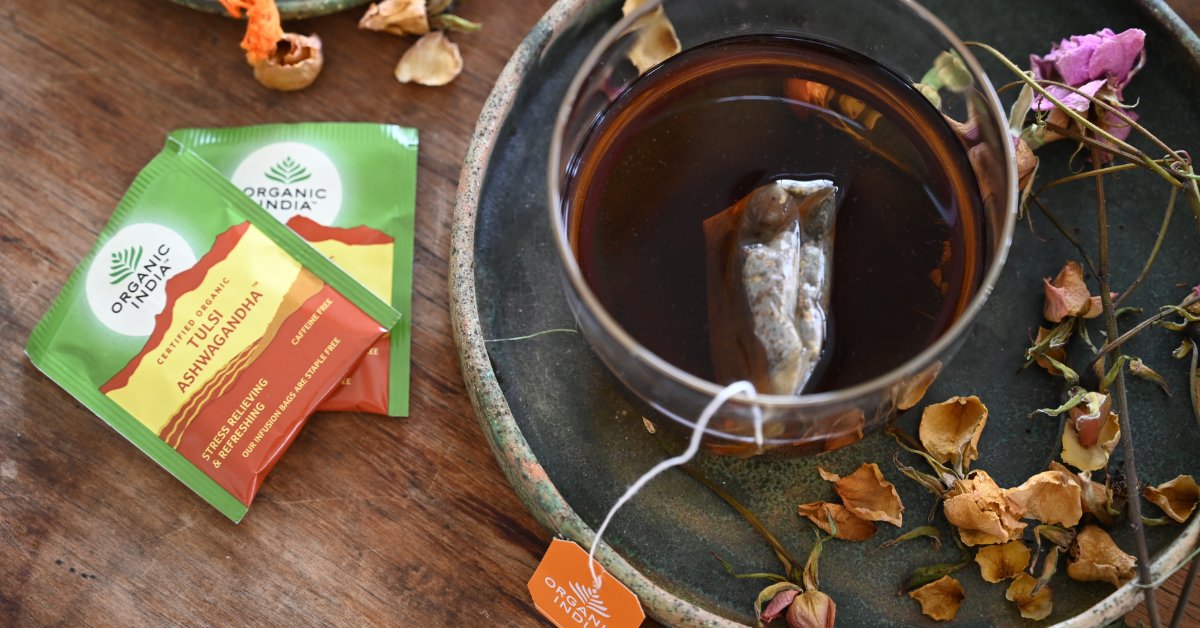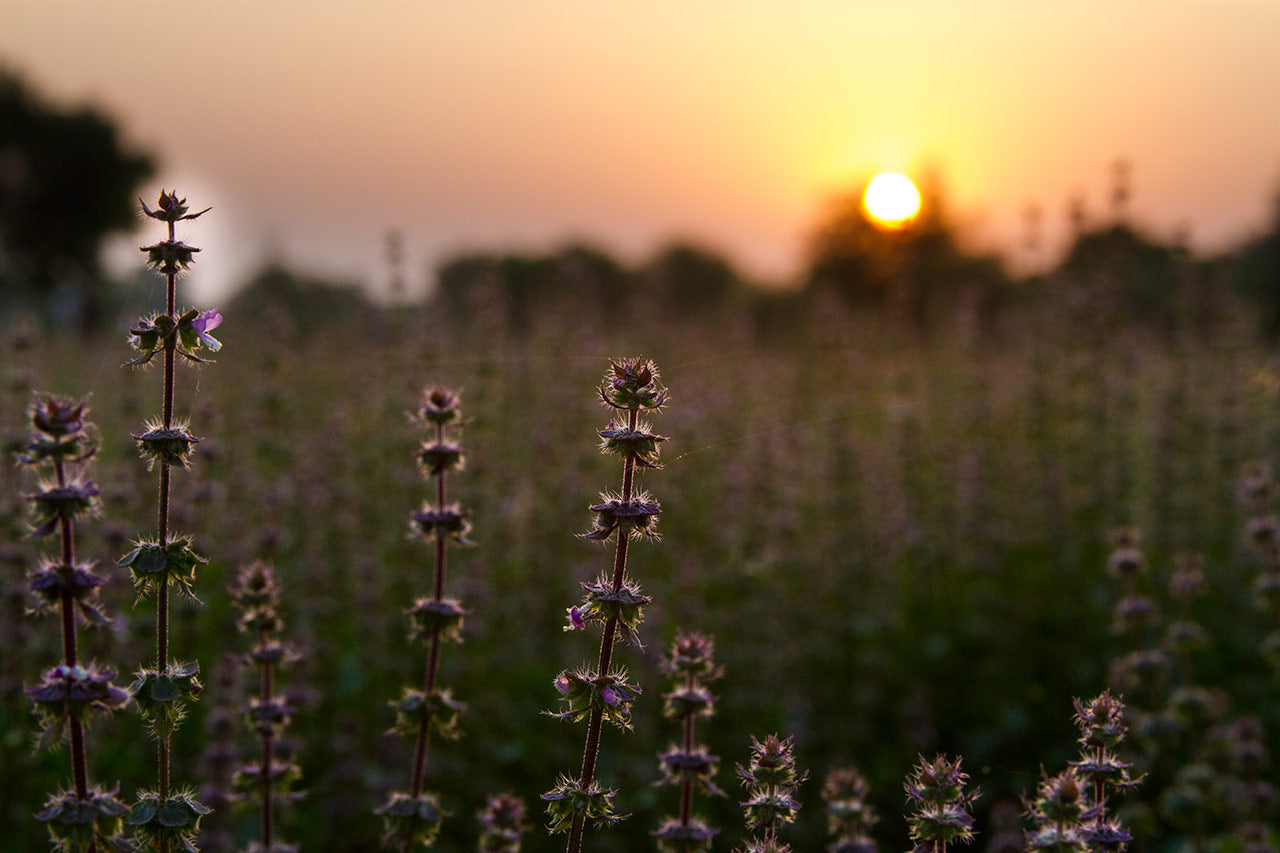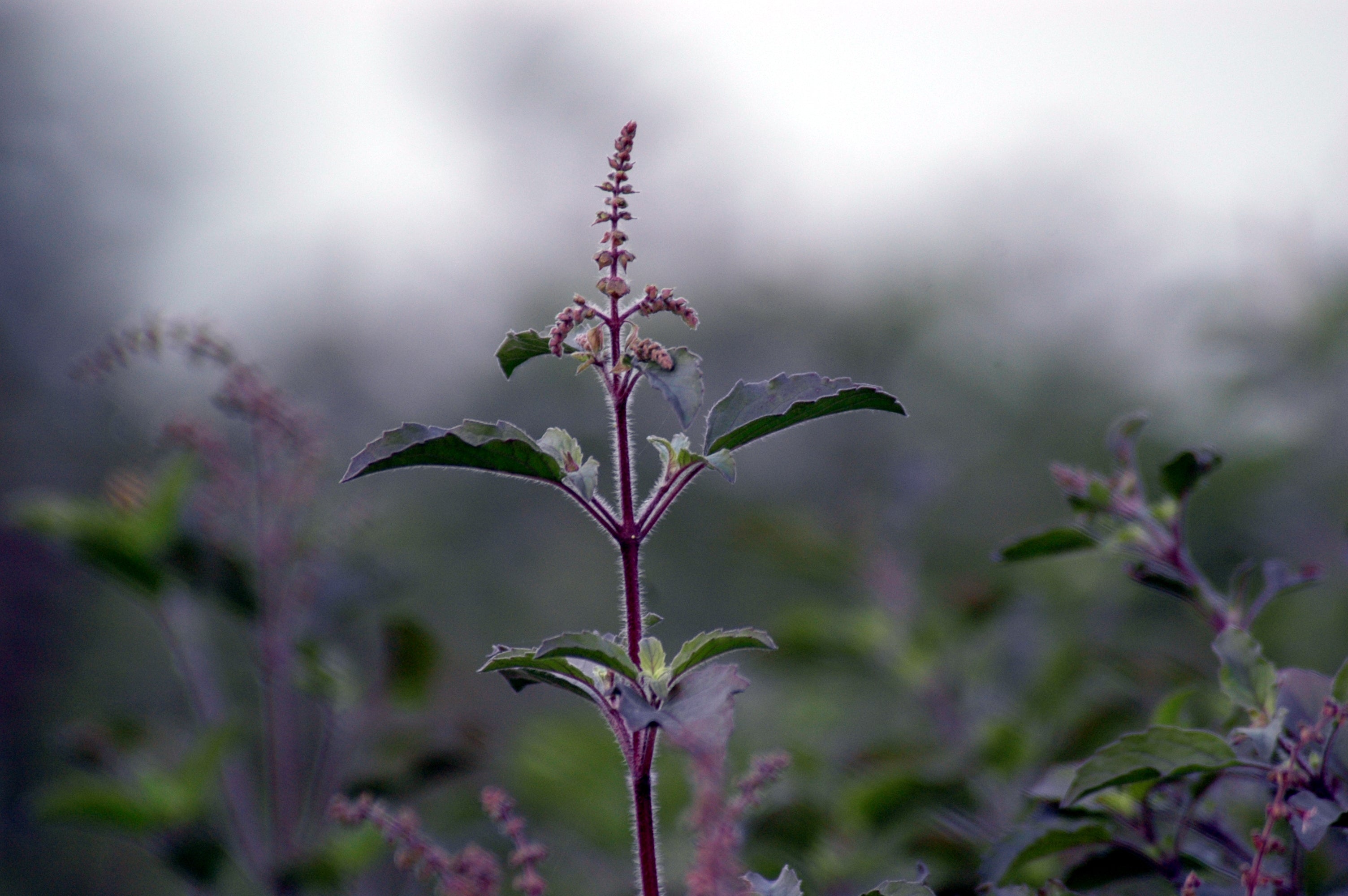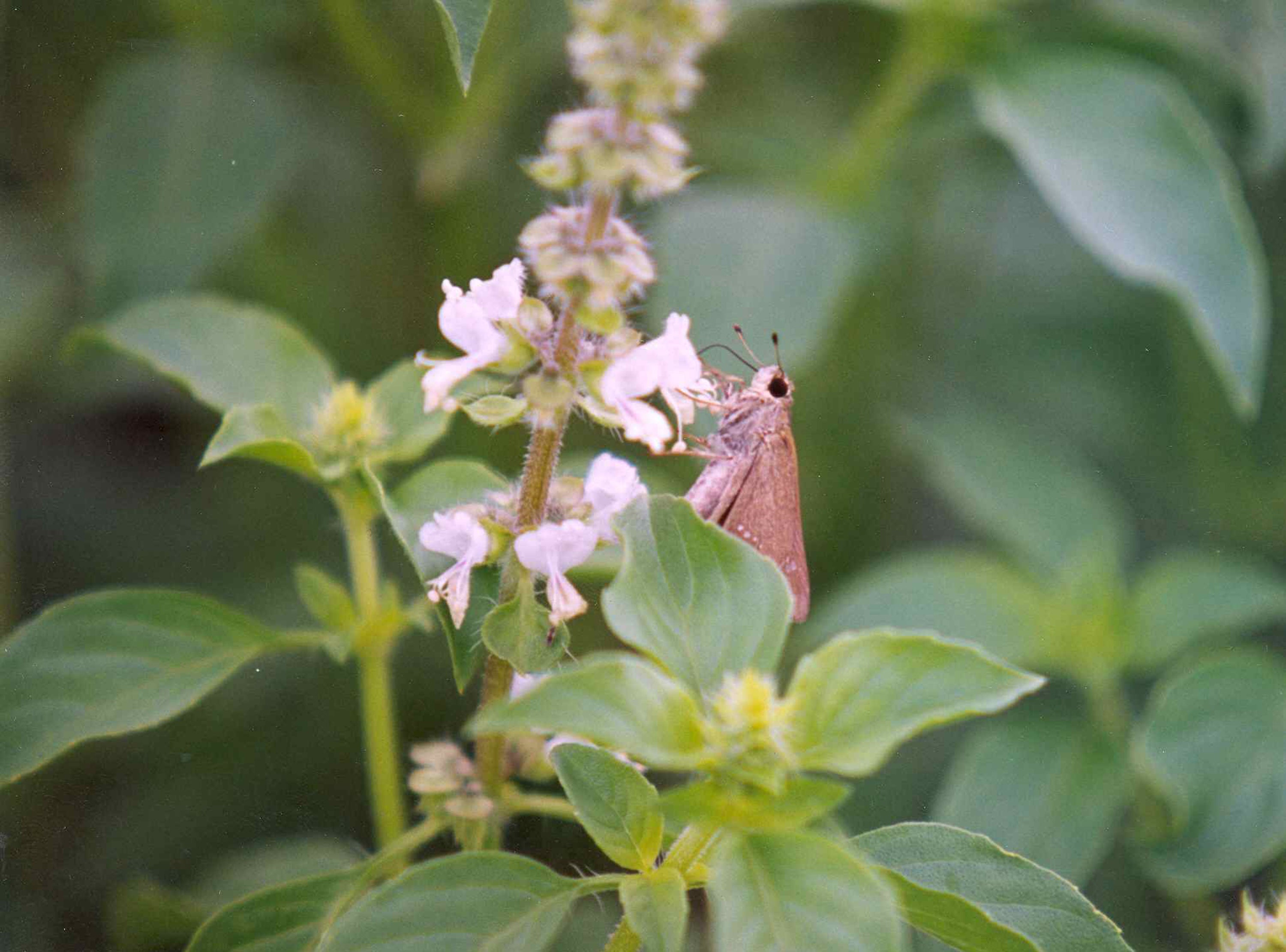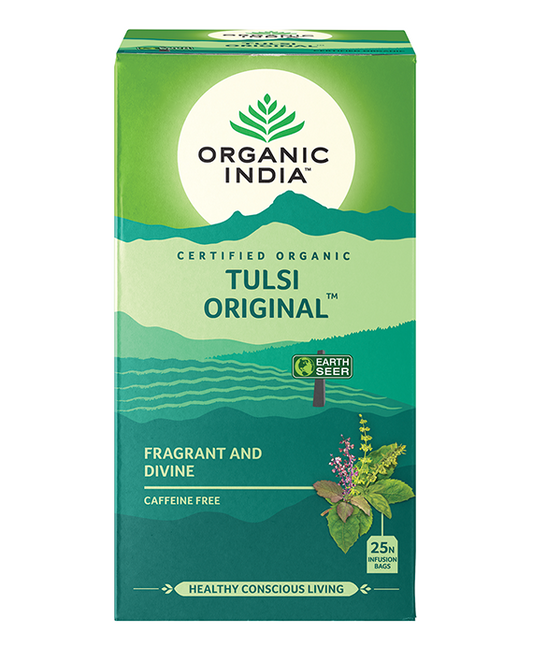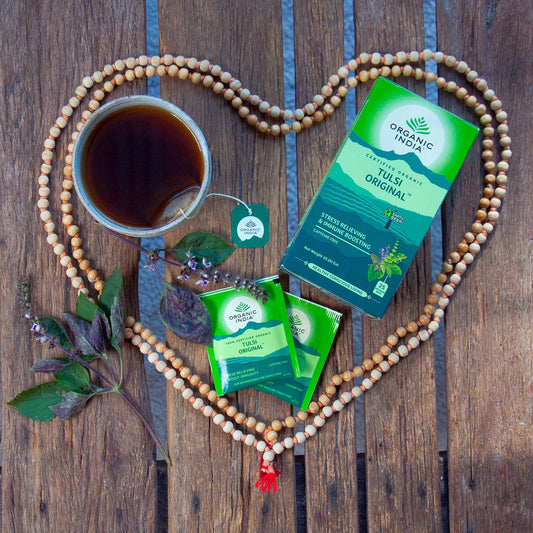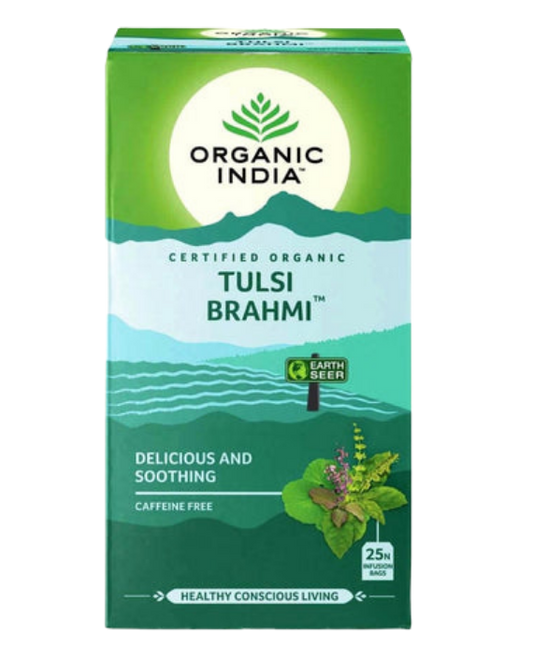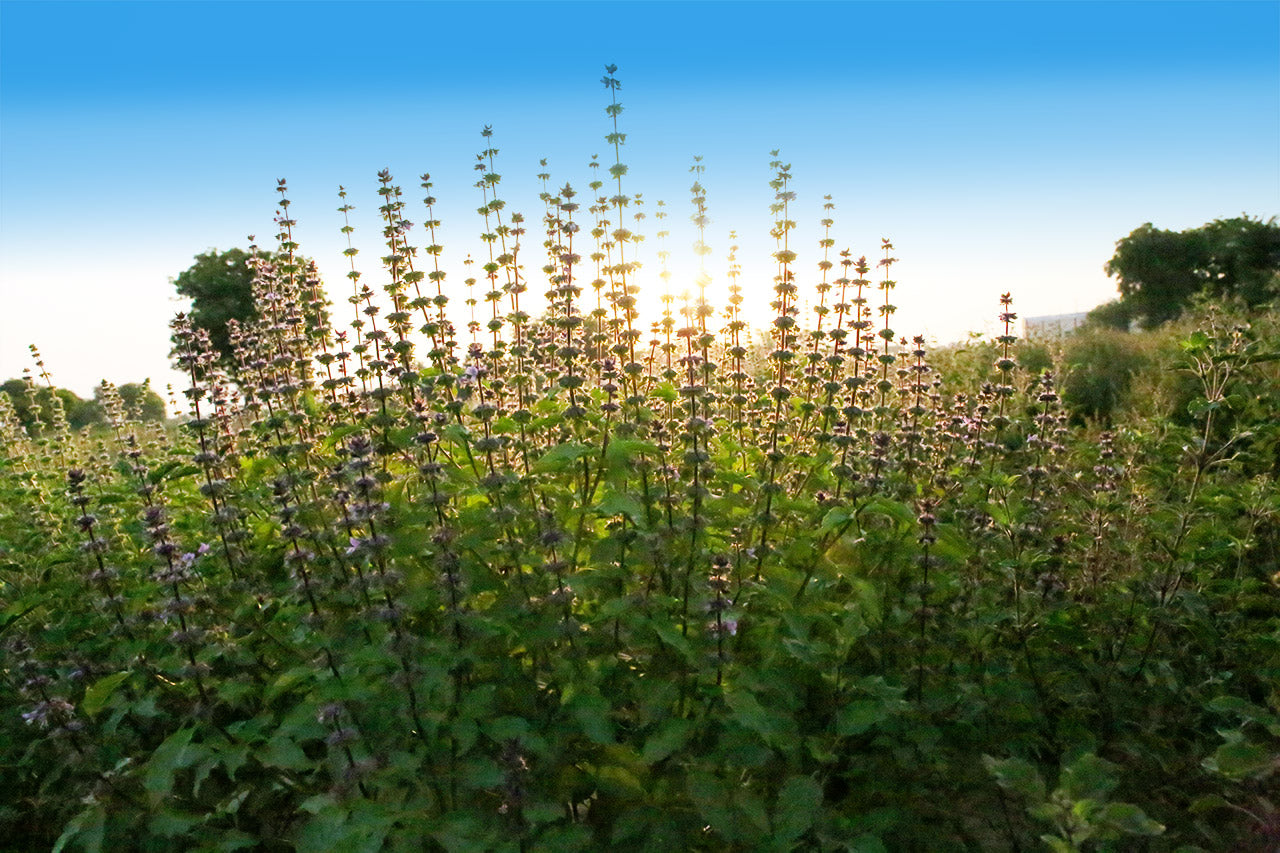
Tulsi 101
What is Tulsi-Holy Basil?
Ocimum tenuiflorum (synonym Ocimum sanctum), commonly known as holy basil, tulsi, (sometimes spelled thulasi) or tulasi, is an aromatic perennial plant in the Lamiaceae family. It is native to the Indian subcontinent and widespread as a cultivated plant throughout the Southeast Asian tropics.
Tulsi is one of the most sacred plants in India and is considered in Ayurveda as “The Queen of the Herbs” for its restorative and spiritual properties.
Still virtually unknown to the western world Tulsi, also known as Holy Basil, is a complex herb with an extensive list of added benefits. Tulsi is a herb revered by Ayurveda (the ancient Indian wellbeing system) for thousands of years to promote whole body health.
What Is Tulsi?
TULSI
You may never have heard of Tulsi but in India, where it is commonly grown, it’s revered as a sacred herb that has many benefits, including working wonders on relieving stress. It’s considered the holiest of plants by Hindus and is used in Ayurvedic medicine and treatment. Tulsi is known by not one, two or three but by more than four other names – all of them hinting at its ‘wonder properties’. You may find Tulsi referred to as Holy Basil, as Mother Medicine of Nature, The Queen of Herbs or The Incomparable One.
Tulsi is a member of the Lamiacae family – the same one as everyday basil. Although they have their family tree in common that’s where the similarities end. You won’t be sprinkling Tulsi leaves on your next meal because it tastes different from the traditional cooking basil (although some people like to include Tulsi in a salad).
TULSI’S THREE VARIETIES
There are said to be 108 varieties of Tulsi- Holy Basil. Each variety of Tulsi has a slightly different look, taste and smell and when combined, create a perfectly balanced herbal infusion with an array of health benefits. We use the 3 varieties with the most potent in adaptogenic quality, rich in antioxidants and immune stimulating.
Rama Tulsi (Ocimum sanctum)Vana Tulsi (Ocimum gratissimum)Krishna Tulsi (Ocimum sanctum)
MODERN RESEARCH HAS CLASSIFIED TULSI AS AN ADAPTOGENIC HERB.
Adaptogens have been shown to support the body’s healthy reactions to stress. Adaptogenic herbs have been used in the Ayurvedic tradition for thousands of years to promote and maintain wellness. In fact, many adaptogenic herbs have been referred to by herbalists as rejuvenative herbs, qi tonic herbs, rasayanas or restorative herbs. They help the body adapt to environmental, physical and emotional stressors, support normal functions and restore balance.
Adaptogens are a unique class of healing plants. Research shows they help balance, restore and protect the body. But what does that mean exactly? Well think about it this way, when life is coming at you fast, adaptogen herbs have a grounding effect. They assist you in handling external stressors – or situations – in a more harmonious way. Stress is one of those interesting phenomenons in the body that is incredibly complex and yet surprisingly simple. We’ve all experienced stress as it’s a simple fact of our everyday lives and human nature. Stress can be both good and bad, acute and chronic, physical and emotional. And how we each react to stress varies from person to person as well as experience to experience. But through all the stress of everyday life, adaptogens are there to help ground us in taking on what life throws at us. Whether it’s a hectic schedule, challenging relationship,
heat or cold, noise, financial worries, high altitudes or any number of other stressors, adaptogens help your body adapt.
This elite class of herbs can give strength, energy, stamina, endurance and improve your mental clarity. In many parts of the non-Western world adaptogens can be used extensively in high-risk, fast-reflex occupations, from athletes to miners to deep sea divers.
Adaptogens don’t have a specific action; rather they help our bodies respond to any influence or stressor, be it physical, mental or spiritual. They support normal physiological functioning within your body and have an overall tonifying effect, benefiting systems throughout the entire body including the circulatory, respiratory, digestive, reproductive and nervous systems.
ADAPTOGEN CLASSIFICATION
According to Dr. David Winston, an expert on Adaptogens, adaptogen must meet 3 specific criteria:
• The substance is relatively non-toxic to the recipient.
• It influences many organs or body systems (non-specific). Then acts by increasing resistance of the organism to a broad spectrum of adverse biological, chemical, and physical factors.
• It helps modulate system function and maintain homeostasis
These natural wonders have already been scientifically substantiated and in no time they’ll became a household name worldwide.
HOW ADAPTOGENS WORK
Adaptogenic compounds help alleviate the stress response. They work to bring the hormones of your adrenal system back into balance and overcome adrenal fatigue, a common condition of chronic stress. Some adaptogens such as Tulsi-Holy Basil do this by lowering cortisol, the stress hormone. Elevated cortisol levels and chronic stress can affect every physiological system in your body. It can make you anxious and irritable, lead to weight gain and bone loss, contributes to diabetes and heart disease risk, and depletes your energy levels. Stress also often disturbs sleep patterns, lowers immunity and affects normal digestive functioning. Needless to say, adaptogens naturally help you respond to stress better!
Currently there are about 13 agreed upon plants classified as adaptogens, with further research being done every day. Here are our top 5:
TULSI
Holy Basil or Tulsi is one of the most powerful herbs alive. The herb was a staple of Hindu mythology and considered sacred by the Indian royalty. Modern science has shown that this distinctive herb is incredibly good for balancing the mind, body and spirit. Tulsi helps the bodily systems adapt, balance and increase resilience.
PANAX GINSENG
Perhaps the best known adaptogen, Panax Ginseng (Asian ginseng) is also considered one of the most potent. Research has validated Asian Ginseng’s use for improving mental performance and the ability to withstand stress. This red ginseng also has antioxidant effects, antidepressant effects, and can help naturally lower blood pressure and blood sugar levels.
ASHWAGANDHA
One of the most powerful herbs in Ayurvedic healing used since ancient times for a wide variety of conditions, Ashwagandha is most well-known for its restorative benefits. This adaptogen is traditionally prescribed to help people strengthen their immune system after an illness.
RHODIOLA ROSEA
The herb Rhodiola rosea is remarkable plant with a wide history of uses. Rhodiola rosea strengthens the nervous system, fights depression, enhances immunity, elevates the capacity for exercise, enhances memory, aids in weight reduction, increases sexual function and improves energy levels. Its anti-stress and fatigue-fighting properties make it one of the most popular botanicals in all of Siberia.
LICORICE
A mild, warming herbal adaptogen, Licorice reduces stress by nourishing weakened adrenal glands, lowering cortisol levels, and helping balance the immune system. It reduces coughs and histamine production, the substance behind inflammation. Licorice is often found in herbal formulas (5-10%) because it tastes good and moderates the effects of stronger herbs.
STRESS LESS LIVE MORE
In a world filled with dominating distractions from all sides – and an increasing awareness about how our mental state affects our physical state — the need to find peace of mind has become all the more important.
When you stray too far from conscious living, stress can become chronic—and it can have lasting effects. Over the long run, when your adrenal glands pump out abnormally large amounts of the stress hormone cortisol, your blood pressure and blood sugar go up, your immunity response goes down and your body becomes more vulnerable to infections and disease. Stress is inevitable; but it doesn’t have to be constant or chronic. Mindfulness is the root of awareness and choice; it’s a catalyst for conscious, inspired living and your guide on a journey of wellness.
Consider that you might even be addicted to stress, feeling that you must respond to every ping from emails and texts instead of disconnecting for downtime and a good night’s sleep. A mindfulness practice—think meditation, yoga, regular walks, cooking, connecting with loved ones—can really help.
As much as you can temper stress with mindfulness and nutrition, adaptogenic herbs such as Tulsi are also an important part of a healthy stress-management regimen. These remedies bolster stress-resistance by shifting biochemistry and helping you adapt to the whirlwinds of life.
TULSI's INDIAN ROOTS
For more than 5,000 years, Tulsi has been revered as one of the most sacred herbs in India, infused with restorative power.
Hindus view Tulsi as a goddess (a manifestation of Lakshmi) in the form of a plant bestowed with great spiritual powers. According to legend, no amount of gold could outweigh Krishna’s power, but a single Tulsi leaf placed on the pan in loving devotion tilted that scale.
As Tulsi traveled west along the early trade routes from the Orient to Europe, it became known to the Christians as “sacred” or “holy” basil as is reflected in its Latin botanical name, Ocimum sanctum. They hailed Tulsi as “The King of Herbs” instead of as a queen, and Holy Basil became routinely included in legends, offerings and worship rituals and was looked on by many as a gift of Christ.
In India today Tulsi is still traditionally grown. Almost every Hindu household contains a Tulsi or Indian Basil plant. While tree worship is not uncommon in Hinduism, the Tulsi plant is regarded the holiest of all plants. It is planted outside the home and is worshipped both in the morning when the sun rises and in the evening when the sun sets. The devotees generally water the plant as he or she says a prayer by reciting holy mantras. Mantras are the calling of deity’s names in Hinduism. Every part of the Tulsi plant is revered and considered sacred – even the soil around the plant is considered holy. The leaves in India are used to make a delicious and refreshing tea that possesses wonderful health benefits, along with many other uses.
ORGANIC INDIA is the first company to bring Tulsi to the world as a delicious tea.
Every ORGANIC INDIA tea is blended with Tulsi-Holy Basil, Choose from over 20 delicious flavours, functional teas and loose leaf varieties, with both caffeine-free and caffeinated options. All organically grown, there’s something for everyone.
Plus, every mug of ORGANIC INDIA Tulsi tea directly supports the livelihood & wellbeing of rural family farmers in India.
LIQUID YOGA
Regular consumption of Tulsi Tea may be compared with the regular practice of yoga which can be considered “adaptogenic” through nurturing and nourishing the body -mind- spirit while fostering a sense of relaxation and wellbeing …. Like yoga, tulsi has a calming effect that leads to clarity of thought, along with a more relaxed and calm disposition.”
Prof Marc Cohen, RMIT University, MBBS (Hons), PhD, BMed Sc(Hons)
It’s estimated that up to 90% of all doctors visits are for stress-related illnesses. Tulsi has been classified by modern research as an adaptogen which implies that it holds stress relieving properties. If you are a fan and regular practitioner of yoga, you will be happy to know that Tulsi can create similar effects to your yoga practice.
Tulsi and Tulsi tea has become known as ‘liquid yoga’ because, like yoga, tulsi has a calming effect that can lead to clarity of thought, along with a more relaxed and calm disposition. According to Marc Cohen of RMIT University in Melbourne, “regular Tulsi tea consumption can be compared with regular practice of yoga.” The practice of yoga is also considered “adaptogenic” through fostering a sense of relaxation and wellbeing for the mind, body and spirit.
One study done on patients with generalised anxiety disorder found that 500 mg of Tulsi twice daily significantly reduced anxiety and associated stress, depression, and inattention. Another study found that healthy but stressed adults experienced almost a 40% reduction in general stress symptoms including forgetfulness and fatigue when consuming Tulsi. If you miss your yoga class, don’t fret – regular consumption of Tulsi tea can give you a similar relaxed feeling and calm disposition as your yoga practice.
DRINK UP!
HOW TO GROW TULSI
WHAT YOU’LL NEED:
• High quality rich potting soil with perlite
• Tulsi seeds
• Pots of your choice
• Watering can or spray bottle
• Plastic wrap
• 10-10-10 liquid fertiliser (known as
all-purpose fertiliser)
• Neem (optional)
This delicious herb can be challenging to keep alive, so find out how to keep your plant healthy and flourishing.
STEP 1
Fill your favourite pots with a high quality potting soil. Water the soil thoroughly. Sow the seeds 1⁄4-inch deep spaced 1⁄2-inch apart. Gently pat down the soil and mist the seeds gently. Place plastic wrap over the pot to keep the soil continuously moist, but not soggy.
STEP 2
Locate Tulsi where it receives at least 6 hours of direct sunlight daily. A north facing window is ideal. Provide shade during the hottest hours of the day. Be sure to keep the soil moist. Tulsi takes about three weeks to sprout.
STEP 3
Once your seedlings sprout, remove the plastic wrap cover. Thin seedlings to about 1 inch apart when they are 1 inch tall. Continue to keep the soil moist. As your seedlings develop three or four sets of leaves, it’s time to transplant them to separate containers. Simply separate each plant into its own container, being mindful of its delicate roots. Once you’ve finished transplanting your seedlings, water each container generously.
CARING FOR YOUR TULSI
To encourage growth, pinch the tops of the Tulsi plant when they are forming 4 to 6 pairs of leaves. Also remove flower buds when they appear. This will prevent your plant from producing seed & will support lush growth. Fertilise your plant once every other week with a 10-10-10 liquid fertiliser.
Shop Tulsi Tea
-
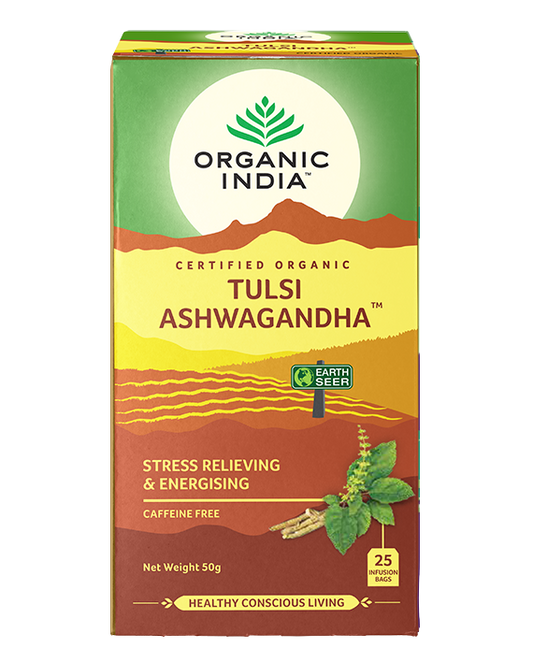
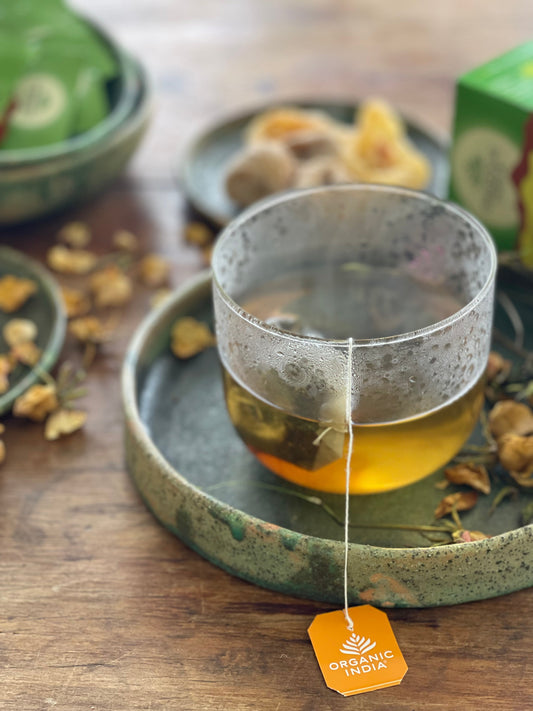 Back In Stock Soon
Back In Stock SoonTulsi Ashwagandha
4.8 / 5.0
(5) 5 total reviews
Regular price $11.00Regular priceUnit price / per -
Tulsi Original
5.0 / 5.0
(8) 8 total reviews
Regular price $10.00Regular priceUnit price / per -
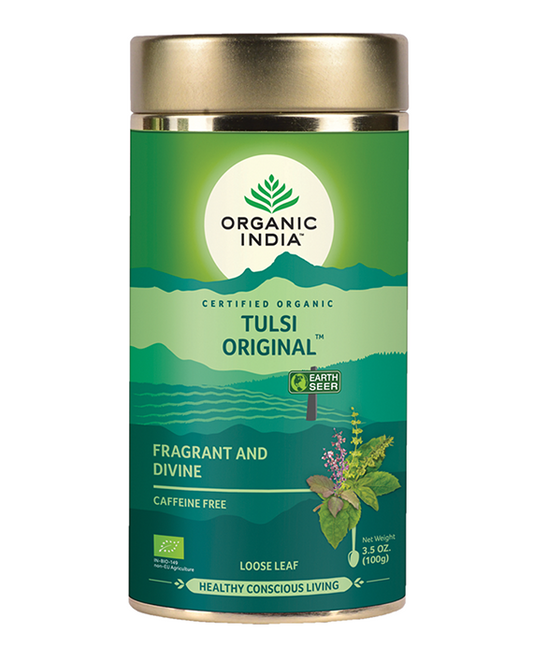
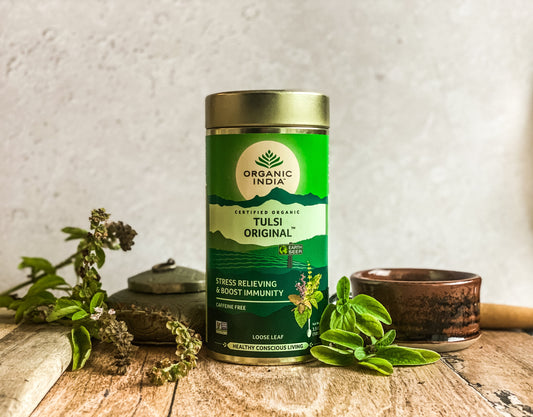 Back In Stock Soon
Back In Stock SoonTulsi Original Loose Leaf
5.0 / 5.0
(1) 1 total reviews
Regular price $14.00Regular priceUnit price / per -
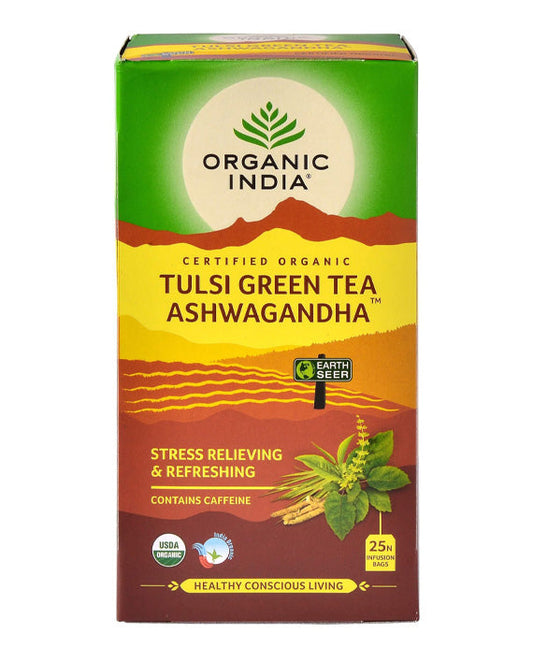
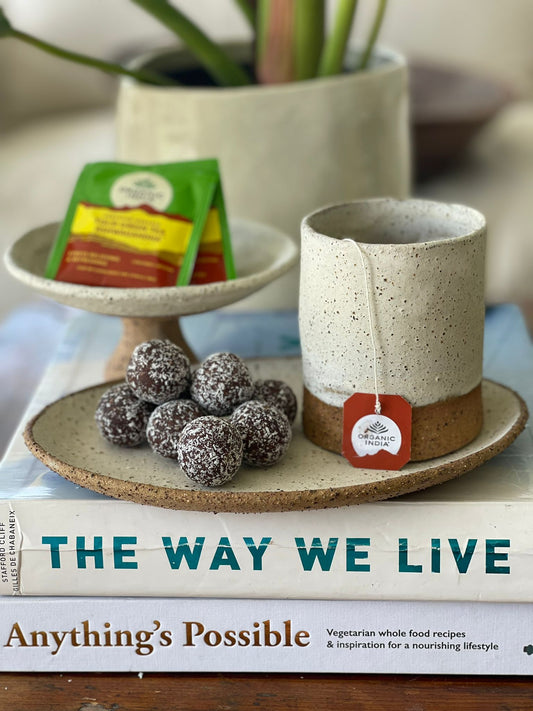 Back In Stock Soon
Back In Stock SoonTulsi Green Tea Ashwagandha
5.0 / 5.0
(2) 2 total reviews
Regular price $10.00Regular priceUnit price / per -
Tulsi Brahmi
5.0 / 5.0
(3) 3 total reviews
Regular price $10.00Regular priceUnit price / per
